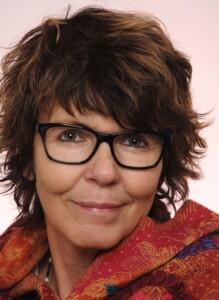 Katja Friedrich, How “Multi-Culti Can Work” – Media Education for Intercultural Tolerance, Journal THEMA JUGEND No. 1/2018: „Wir können Frieden“ (We can make peace)
Katja Friedrich, How “Multi-Culti Can Work” – Media Education for Intercultural Tolerance, Journal THEMA JUGEND No. 1/2018: „Wir können Frieden“ (We can make peace)
Tolerance and equity are key values of our democratic societies and form the basis for our peaceful co-existence. However, hate speech, discriminating or racist statements, and disinformation are on the rise – online and offline. Due to their intensive use of digital media, young people in particular are confronted with prejudice, fake news, and manipulative images, and are even exposed to extremist rhetoric that targets them intentionally. How can educational institutions respond adequately to this? How can everyone learn together to develop and express a respectful posture towards the “other”?
The European project “MEET” (Media Education for Equity and Tolerance) addresses this very issue: how can young people learn to see through the mechanisms of propaganda and discrimination and in doing so cultivate more constructive ways of expressing their own opinions? Since 2016, the project consortium with members in five European countries, among them medien+bildung.com in Ludwigshafen, has been developing learning scenarios for young people aged 13 through 19 in order to promote a critical and intercultural understanding of media as well as the ability to use media more consciously.
Young people and educators are being integrated into an “action research” process – research that is practically oriented and aims, in a mutual effort, at giving viable form to methods for intercultural media education.
Continue reading “How “Multi-Culti Can Work” – Media Education for Intercultural Tolerance”
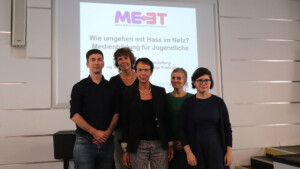

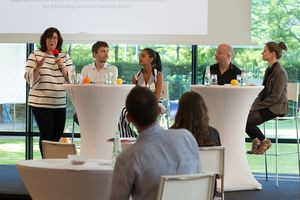
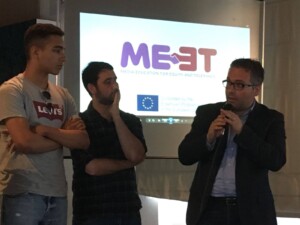 Thursday, 24th and Friday 25th May at the Department of Educational Sciences and Psychology of the University of Florence was hold the conference Media Education in the global society. Experiences and transfer of good practices. The event aimed to take stock of the role of media education in the training of the 21st century citizen, with particular reference to the challenges of globalization, interculturalism and socio-cultural inclusion. The aim was to evaluate the pedagogical potential of an area of educational research that can provide analytical tools useful for a more critical reading of communication on hot topics such as immigration, cohabitation, post-colonial citizenship.
Thursday, 24th and Friday 25th May at the Department of Educational Sciences and Psychology of the University of Florence was hold the conference Media Education in the global society. Experiences and transfer of good practices. The event aimed to take stock of the role of media education in the training of the 21st century citizen, with particular reference to the challenges of globalization, interculturalism and socio-cultural inclusion. The aim was to evaluate the pedagogical potential of an area of educational research that can provide analytical tools useful for a more critical reading of communication on hot topics such as immigration, cohabitation, post-colonial citizenship.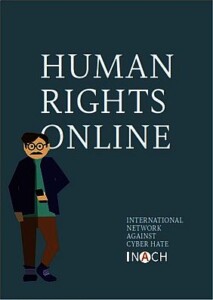 INACH, the International Network against Cyber Hate, is a foundation under Dutch law, with a board as governing unit. INACH has its office/secretariat in Amsterdam. INACH has more than 20 members around the world who consist of organizations handling complaints concerning discrimination on Internet who are able to work independently from the network (self-supporting). INACH’s new booklet about online hate is online available. This booklet will enable readers to have a better understanding of INACHs work, vision, mission and goal.
INACH, the International Network against Cyber Hate, is a foundation under Dutch law, with a board as governing unit. INACH has its office/secretariat in Amsterdam. INACH has more than 20 members around the world who consist of organizations handling complaints concerning discrimination on Internet who are able to work independently from the network (self-supporting). INACH’s new booklet about online hate is online available. This booklet will enable readers to have a better understanding of INACHs work, vision, mission and goal.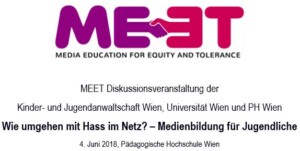 Cyberbullying, fake news, hate speech – these terms have long since become part of everyday school life. Online, rumors and hate messages spread faster than ever, opinions are sold as facts and behind it is an algorithm that is hard to see through. For the schools, online media are another challenge and usually they are left alone. The MEET discussion event analyzes the mechanisms of lies and hate in the net and presents concrete tools and strategies for media education in schools.
Cyberbullying, fake news, hate speech – these terms have long since become part of everyday school life. Online, rumors and hate messages spread faster than ever, opinions are sold as facts and behind it is an algorithm that is hard to see through. For the schools, online media are another challenge and usually they are left alone. The MEET discussion event analyzes the mechanisms of lies and hate in the net and presents concrete tools and strategies for media education in schools.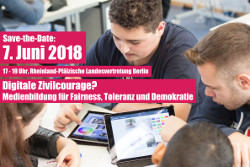 Digital civil courage?
Digital civil courage?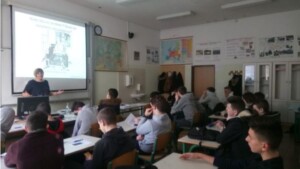
 In Italy the MEET’s classroom activities started in November 2017 at the secondary school Gramsci-Keynes in the town of Prato. The researcher/media educator Francesco Fabbro along with 3 teachers (Luca Cappelli, Giuseppe Consentino and Silvia Ermini) and 18 students (age 16-18) tested the Learning Scenario “Challenge violence and play your rights”. Students firstly engaged in media analysis oriented activities focusing in particular on the representation of violence and migrants in videogames and movies. In the second part of the Learning Scenario, students created some fictional game stories inspired to real episodes where human rights were violated or contested. Afterward, they developed different aspects of their game stories (e.g. definition of game play and characters) through which struggles for equal rights were represented and advocated.
In Italy the MEET’s classroom activities started in November 2017 at the secondary school Gramsci-Keynes in the town of Prato. The researcher/media educator Francesco Fabbro along with 3 teachers (Luca Cappelli, Giuseppe Consentino and Silvia Ermini) and 18 students (age 16-18) tested the Learning Scenario “Challenge violence and play your rights”. Students firstly engaged in media analysis oriented activities focusing in particular on the representation of violence and migrants in videogames and movies. In the second part of the Learning Scenario, students created some fictional game stories inspired to real episodes where human rights were violated or contested. Afterward, they developed different aspects of their game stories (e.g. definition of game play and characters) through which struggles for equal rights were represented and advocated.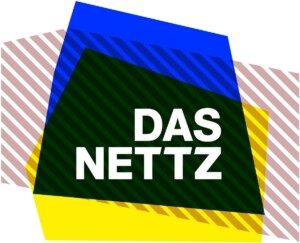 “Das NETTZ” is the networking site against Hate Speech in German-speaking countries. “Das NETTZ” promotes digital moral courage and advocates a positive debate and opinion culture on the web. The NETTZ wants to build and support actors of civil society in their work as a “community of objections”. On the site you will find initiatives, which are committed against Hate Speech.
“Das NETTZ” is the networking site against Hate Speech in German-speaking countries. “Das NETTZ” promotes digital moral courage and advocates a positive debate and opinion culture on the web. The NETTZ wants to build and support actors of civil society in their work as a “community of objections”. On the site you will find initiatives, which are committed against Hate Speech. Katja Friedrich, How “Multi-Culti Can Work” – Media Education for Intercultural Tolerance, Journal THEMA JUGEND No. 1/2018: „Wir können Frieden“ (We can make peace)
Katja Friedrich, How “Multi-Culti Can Work” – Media Education for Intercultural Tolerance, Journal THEMA JUGEND No. 1/2018: „Wir können Frieden“ (We can make peace)